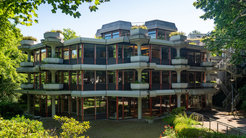
The Philosophy of Right and wrong: Hegel on crime, transgression, and injustice
Conference • September 11–13, 2025 • Freiburg/Germany
Max Planck Institute for the Study of Crime, Security and Law
Judgments of wrong are ubiquitous in moral, political, and legal discourse. Yet, we rarely talk about what is wrong, its place in the world, and its relationship to what is right. This conference brings together scholars to explore the notion of wrong (Unrecht) in and through GWF Hegel’s mature philosophy.
Since his early writings, Hegel was occupied with the question how to reconcile the normative order with deviations from that order. It is a question that pervades the Philosophy of Right, where his political theory finds its final formulation. When it first appears, the notion of wrong reveals the deficiency of a system based on abstract rights; after that, it remains an undercurrent of the argument. Arguably, the problem of righting wrongs does not just inform, famously, Hegel’s theory of punishment but also his examinations of morality, the capitalist market, courts, poverty, citizenship, and international politics, among other things.
From 11 to 13 September 2025, the Independent Research Group “Criminal Law Theory” welcomes scholars from jurisprudence, philosophy, political theory, and adjacent fields to a collaborative and interdisciplinary conference on “The Philosophy of Right and wrong”.
Further Information
The overarching ambition of the conference is to put exegetical research into touch with current debates in legal theory, especially criminal law scholarship, and adjacent fields, such as moral philosophy, meta-ethics, and political theory. For a list of themes to be explored, and further background on the conference, please refer to the detailed Call for Abstracts (pdf file).
Speakers are welcome to tackle other questions than the ones listed in the detailed CfA, as long as they connect to the overarching theme. While the focus of the conference is on Hegel’s mature political philosophy, scholars are encouraged to draw on earlier writings if doing so is conducive to accentuating, contrasting, or criticising the argument of the Philosophy of Right.
Presentations will be held in English and should not exceed 30 minutes, allowing for an additional 30 minutes of discussion in each session. We plan to publish the conference proceedings following the event; further details will be shared in due course. If you have any questions about the conference, please feel free to contact us at strafrechtstheorie@csl.mpg.de.
Program
DAY 1 • THURSDAY, SEPTEMBER 11
| 09:00–09:45 | Registration | |
|---|---|---|
| 09:45–10:00 | Introduction by the organizers |
| Section I: | The place of wrong in Hegel’s system | |
|---|---|---|
| 10:00–11:00 |
Angelica Nuzzo
(CUNY Brooklyn) |
Wrong: The dialectic |
| 11:00–11:15 | – Break – | |
| 11:15–12:15 |
Klaus Vieweg
(Jena) |
The beginning of Hegel’s Philosophy of Right – Un-Recht: Forms of the ‘infringement’ of the concept of freedom |
| 12:15–13:30 | – Lunch – | |
| 13:30–14:30 |
Jochen Bung
(Hamburg) |
Elements of the philosophy of wrongs: On property wrongs, wrong conscience, and the wrongs of sovereignty |
| Section II: | Metanormative investigations | |
|---|---|---|
| 14:30–15:30 | Sabina Tortorella (Namur) | The wrong in law and beyond: Forms of injustice in Hegel’s Philosophy of Right |
| 15:30–16:00 | – Break – | |
| 16:00–17:00 | Ignacio Peña Caroca (Warwick) | The naturalistic claim of §127 GPhR : Metaethical implications from the right of necessity |
| 17:00–18:00 | Linda Lilith Obermayr (Vienna) | The right of the wrong and the wrong of the right |
DAY 2 • FRIDAY, SEPTEMBER 12
| Section III: | Wrong judgments and judgments of wrongness | |
|---|---|---|
| 09:30–10:30 |
Matthew Delhey
(Toronto) |
On wrong institutions: Hegel’s (normative) dispute with Gustav Hugo |
| 10:30–11:30 |
Claudia Wirsing
(Braunschweig/Münster) |
What, if anything, went wrong with Roe v. Wade? A Hegelian approach to legal norm justification |
| 11:30–12:00 | – Break – | |
| 12:00–13:00 |
Caroline Wall
(Boston) |
No scars left behind: Hegel’s account of wrongdoing and forgiveness |
| 13:00–14:00 | – Lunch – |
| Section IV: | Crime, punishment, and responsibility | |
|---|---|---|
| 14:00–15:00 | Alan Brudner (Toronto) | Crimes against the person, the subject, and the individual: The varieties of wrong in Hegel’s Philosophy of Right |
| 15:00–16:00 | Giulia Battistoni (Verona) | Unveiling Hegel’s morality: Subjective will as the foundation of criminal wrong |
| 16:00–16:30 | – Break – | |
| 16:30–17:30 | Thom Brooks (Durham) | A matter of proportion: Hegel on the unstable wrongness of crime over time |
DAY 3 • SATURDAY, SEPTEMBER 13
| Section V: | Beyond right and wrong | |
|---|---|---|
| 09:30–10:30 |
Sabrina Muchová
(Prague) |
Ethical life, Bann, and art: On the question of wrong in society in Hegel and Adorno |
| 10:30–11:30 |
Alan Norrie
(Warwick) |
Hegel, punishment, and its abolition |
| 11:30–12:00 | Concluding remarks by the organizers |
Registration
We are pleased to announce that registration for the conference is now open. To register, please complete the online registration form.
Please note that space is limited, so we encourage you to register early to secure your place.
While travel bursaries are available only for speakers, we are happy to assist participants in finding suitable accommodation in Freiburg.
Venue

The Max Planck Institute for the Study of Crime, Security and Law (MPI-CSL) is located in Freiburg in the suburb of “Wiehre” and can be reached from the main train station/city center by tram line 2 (stop “Holbeinstraße”), by taxi as well as on foot (around 20 minutes). The workshop will take place in an annex building of the MPI at Fürstenbergstraße 19. It is a new building with barrier-free access.
Address
Max Planck Institute for the Study of Crime, Security and Law
Fürstenbergstraße 19
79102 Freiburg
Germany
Directions can be found on Google Maps.
About us

The workshop is organized by Dr. Simon Gansinger and Dr. Dr. Philipp-Alexander Hirsch.
- Simon Gansinger is a postdoctoral member of the Independent Research Group “Criminal Law Theory”. His work focuses on Hegel’s political philosophy and on critical theory in the tradition of the Frankfurt School.
- Philipp-Alexander Hirsch is Leader of the Independent Research Group “Criminal Law Theory” at the Max Planck Institute for the Study of Crime, Security and Law in Freiburg. His research focuses on criminal law and criminal procedure, legal philosophy and legal theory, and the history and philosophy of criminal law in the Age of Enlightenment.
The Max Planck Research Group “Criminal Law Theory” focuses on the analysis of substantive criminal law and criminal procedure and the doctrine in these areas; the analysis centers on the underlying normative structures and principles in order to assess their coherence, justifiability, and persuasiveness. The aim is to draw on the fruits of this analysis to engage in normative theory-building that proposes solutions to problems in criminal law that go beyond interpreting the positive law.

